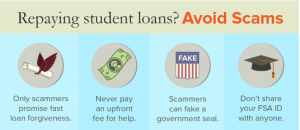Student loan forgiveness scams

A message from Wake Forest Information Systems
After the recent announcement regarding student loan forgiveness, there have been a number of phishing attempts from scammers promising early and special access or guaranteed eligibility for student loan forgiveness.
Here are some Federal Trade Commission (FTC) tips to assist you in avoiding this malicious activity:
- Sign up for updates from the Education Department to be notified when the debt forgiveness process has officially opened.
- Know who your federal student loan servicer is. Make sure it has your most recent contact information. That will help you get the latest updates on the cancellation, as well as the pause on loan payments through the end of 2022.
- Never pay an up-front fee to someone offering debt relief. It’s illegal for companies to charge before they help you. Keep in mind, you do not have to pay for help with your student loans -there’s nothing a company can do for you that you cannot do yourself for free. If you have federal loans, start with StudentAid.gov/repay.
- Do not be rushed. Criminals push consumers to act fast, saying they may miss qualifying for loan forgiveness and other programs if they do not sign up right away.
- Do not share your Federal Student Aid Identification; scammers may use it to break into your account and steal your identity.
- If you spot a scam, report it to the FTC at ReportFraud.ftc.gov.
If you are a recipient of suspicious activity, decline the prompt, forward the suspicious text or email to the Information Systems Security Team at infosec@wfu.edu for further analysis, and then delete the message.
Categories: University Announcements
